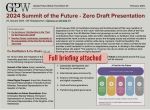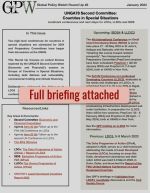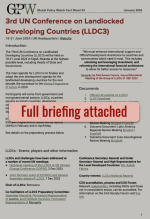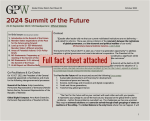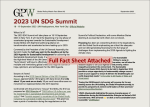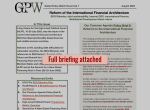Social Watch News
Published on Mon, 2024-05-13 00:00
As part of the 2024 Global South Study Week on Sustainable Human Development, Arab NGO Network for Development (ANND), Third World Network (TWN), The Asfari Institute for Civil Society and Citizenship, Global Policy Forum and Social Watch invite you to a special session: “On the Way to the Summit of the Future: The Challenges of the Multilateral System.” This hybrid event will explore critical global issues and the efficacy of multilateralism in addressing them. |
Published on Mon, 2024-03-04 00:00
Roberto Bissio, Coordinator of Social Watch, spoke at the "Regional Meeting for Civil Society on Sustainable Development - On the Way to the Summit of the Future". The recording is here . The Arab NGO Network for Development in collaboration with the members of the Regional Sustainable Development Platform (ATUC, CAWTAR, HIC-HRLN, ARFPD, ANDE, CAWTAR and TI) organized the "Regional Meeting for Civil Society on Sustainable Development - On the Way to the Summit of the Future" on March 4, 2024 in Beirut. |
Published on Mon, 2024-02-12 21:11
Member States have started negotiations on the Summit of the Future (SotF) outcome document: the Pact for the Future. The process kicked off on 29 January 2024 with the co-facilitators' presentation of the Zero Draft of the Pact and Member States’ reactions to the Zero Draft. This Global Policy Watch Factsheet #5 on the Zero Draft of the Pact for the Future walks through a summary of the co-facilitators’ presentation on how they approached the Zero Draft, Member State reactions and useful links including to the Zero Draft and negotiations timetable. The previous GPW Factsheet #4 on SotF also provides valuable information on the process. |
Published on Mon, 2024-02-05 15:25
Two high-level conferences for countries in special situations are scheduled for 2024 and Preparatory Committees have begun their discussions at the UNHQ. This Round Up focuses on central themes explored by the UNGA78 Second Committee (Economic and Financial)’s session on Groups of Countries in Special Situations, including debt distress and vulnerability, concessional funding and climate financing. Deliberations addressed the follow-up to LDC5 and the lead-up to the 2024 conferences, SIDS4 and LLDC3. |
Published on Thu, 2024-01-18 09:09
The Third UN Conference on Landlocked Developing Countries (LLDC3) will be held on 18-21 June 2024 in Kigali, Rwanda at the highest possible level, including Heads of State and Government. The main agenda for LLDC3 is to finalize and adopt the new development agenda for the landlocked developing countries for the next decade, the successor to the Vienna Programme of Action in 2024. This Global Policy Watch briefing explores the pertinent issues and trajectory of the process, with the different priorities revealed in Member State statements. |
Published on Wed, 2023-11-01 16:42
Considered a “once-in-a-generation opportunity” to address inequities in global governance and reset international cooperation, the Summit of the Future (SoTF) will be a cornerstone among a series of high-level UN meetings in 2024. While Member State priorities differ, they have confirmed that the Summit will be held on 22-23 September 2024 and have agreed on the elements and next steps towards the adoption of “a concise, action-oriented outcome document entitled ‘A Pact for the Future’, agreed in advance by consensus through intergovernmental negotiations”. This Global Policy Watch fact sheet explores the process and negotiations going forward and the different priorities revealed in Member State statements. |
Published on Fri, 2023-10-06 21:59
Many world leaders during the UN General Assembly High-level General Debate (19 to 26 September 2023) referenced the sorry state of multilateralism and the various alignments and groupings, some to counter the lack of agency and redress power asymmetries across multiple policy streams. In conjunction with the historical responsibilities of developed countries for carbon emissions, many called for reparations for slavery and colonialism, highlighting the historical injustice that continues to disadvantage developing countries. Reform of the international financial architecture featured consistently on the agenda, as did a focus on demands for action on Loss and Damage at the upcoming COP 28 and the devastating debt distress, especially in small- and medium-sized countries. |
Published on Sat, 2023-09-16 17:14
The UN ECOSOC High-level Political Forum on Sustainable Development (HLPF), operating under the auspices of the Economic and Social Council (ECOSOC), has convened regularly since it was established by the 2012 United Nations Conference on Sustainable Development (Rio+20). It is a means for Member States, the UN System and Major Groups and Other Stakeholders to assess progress on the Sustainable Development Goals (SDGs). In 2023, the HLPF took place from 10 - 19 July, and the main SDGs subjected to in-depth review were SDG 6 on clean water and sanitation, SDG 7 on affordable and clean energy, SDG 9 on industry, innovation and infrastructure, SDG 11 on sustainable cities and communities and SDG 17 on partnerships for the Goals. |
Published on Thu, 2023-09-07 18:25
At the half-way mark to fulfilling the 2030 Agenda for Sustainable Development, the UN "SDG Summit" is charged with igniting a correction course as the UN, Member States and numerous studies agree that the Sustainable Development Goals (SDGs) are seriously off-track and the consequences of failure affect all countries and sectors of society. Key themes include: the SDG Stimulus, debt swaps, international financial architecture reform, re-channeling of Special Drawing Rights amongst other issues. Global Policy Watch’s factsheet highlights the significance, programme, events and Political Declaration of the Summit and includes relevant links and documents for further exploration. |
Published on Thu, 2023-09-07 01:38
A key theme for the High-Level Political Forum (HLPF), 10-20 July 2023, was the issue of the current international financial architecture (IFA) that disproportionality disservices low and middle-income countries. Reforms to IFA, tackling debt difficulties for vulnerable countries, the SDG Stimulus, and references to SDG Summit, Summit of the Future and Summit for a New Global Financing Pact were highlighted by various Member States and other stakeholders at the HLPF and at the Summit for a New Global Financing Pact in Paris (22-23 June 2023). |
SUSCRIBE TO OUR NEWSLETTER



